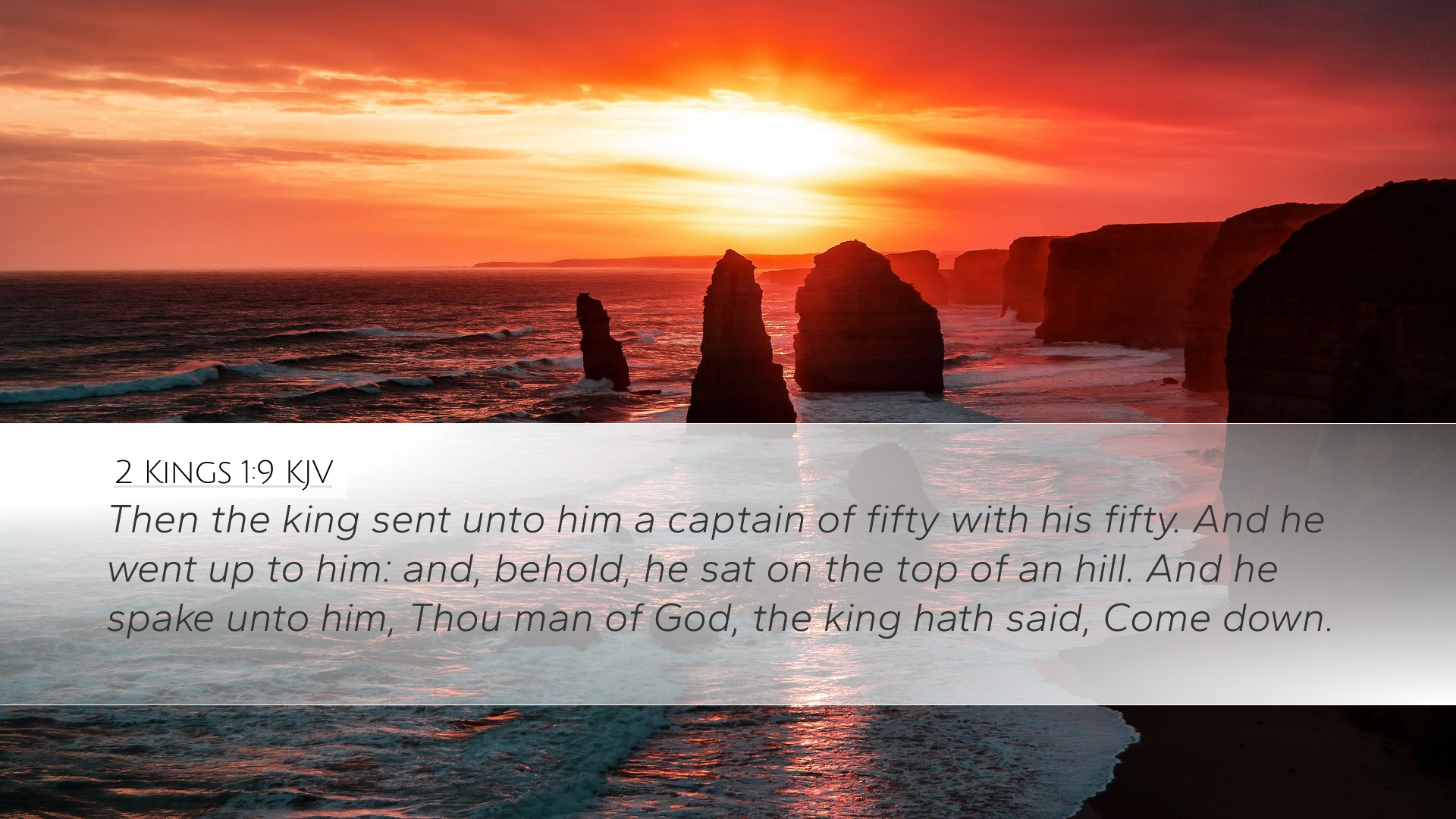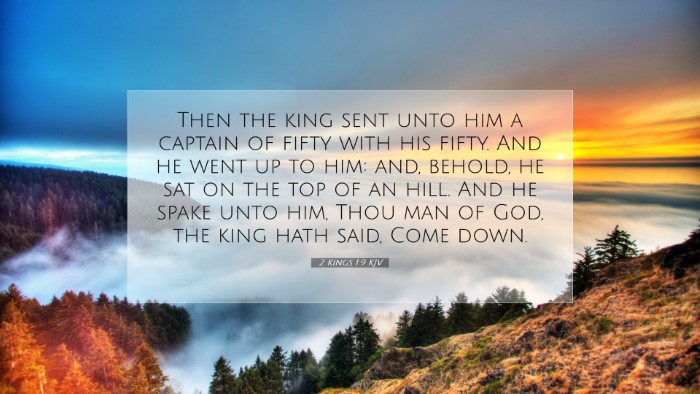Old Testament
Genesis Exodus Leviticus Numbers Deuteronomy Joshua Judges Ruth 1 Samuel 2 Samuel 1 Kings 2 Kings 1 Chronicles 2 Chronicles Ezra Nehemiah Esther Job Psalms Proverbs Ecclesiastes Song of Solomon Isaiah Jeremiah Lamentations Ezekiel Daniel Hosea Joel Amos Obadiah Jonah Micah Nahum Habakkuk Zephaniah Haggai Zechariah Malachi2 Kings 1:9
2 Kings 1:9 KJV
Then the king sent unto him a captain of fifty with his fifty. And he went up to him: and, behold, he sat on the top of an hill. And he spake unto him, Thou man of God, the king hath said, Come down.
2 Kings 1:9 Bible Commentary
Commentary on 2 Kings 1:9
2 Kings 1:9 states: "Then the king sent to him a captain of fifty with his men. And he went up to him: and, behold, he sat on the top of a hill. And he spake unto him, O man of God, the king hath said, Come down."
Introduction
This verse introduces a pivotal moment in the narrative of the prophet Elijah, capturing the tension between the authority of the king and the divine authority of a prophet. The interaction between the king's envoy and Elijah sets the stage for a dramatic confrontation that reveals key themes in the life of the prophet and the era's spiritual dynamics.
Summary of Insights
The commentaries by Matthew Henry, Albert Barnes, and Adam Clarke provide profound insights into this verse, drawing on historical context, theological implications, and the practical applications of this biblical account.
Matthew Henry's Commentary
Human Authority vs. Divine Authority: Henry emphasizes the contrasting authorities represented in the text. The king sends a captain and fifty men, which signifies his power and the expectation of obedience. However, Elijah, as a prophet of God, embodies a higher authority. Henry points out that the prophet remains steadfast on the hill, symbolizing his separation from worldly power and his divine commission.
The Nature of Obedience: Henry notes that the captain addresses Elijah as "O man of God," recognizing Elijah's prophetic role. This title signifies respect and acknowledgment of his relationship with the divine. Yet, the captain’s command from the king illustrates a tension; while he recognizes Elijah as a man of God, he is still sent to impose the king's will upon him.
Albert Barnes' Commentary
The Symbolism of Locations: Barnes comments on the geographical setting of the verse. Elijah sitting atop a hill represents a place of authority and visibility, as hills often symbolize closeness to God in biblical literature. This position demonstrates that Elijah's stand is not just physical but also spiritual, positioning him between heaven and earth as a mediator.
The Response of the Prophet: Barnes explains that the captain's command is an attempt to force God’s messenger into submission. The command "Come down" contrasts with the call of God, who often calls His messengers to rise up in faith and confront worldly powers. This illustrates a recurrent biblical theme — the world's attempts to suppress divine truth.
Adam Clarke's Commentary
The Role of the Captain: Clarke delves into the character of the captain. Being a representative of the king, he exemplifies those who seek to impose human wisdom and authority over divine will. Clarke highlights the pride and arrogance that often accompany such positions, demonstrating how earthly authority frequently oversteps its bounds when confronting prophets of God.
Prophet’s Integrity: Clarke reflects on Elijah’s posture and demeanor at the moment. Elijah’s refusal to comply with the king’s order reveals his steadfastness in faith and integrity; he does not compromise his mission for the sake of royal demands. Clarke illustrates how true prophets must withstand the pressures of authority to remain faithful to their divine mandate.
Theological Implications
- The Sovereignty of God: The verse underscored by these commentaries reflects the sovereignty of God over human governance. Elijah, representing the voice of God, stands in stark contrast to King Ahaziah’s hubris.
- Prophetic Resistance: The interaction demonstrates the often adversarial nature of prophetic ministry in the face of political power, emphasizing the call for prophets to uphold God’s truth in challenging situations.
- Divine Calling: Elijah’s position on the hill symbolizes the higher calling of those who speak for God, urging readers to reflect on their own responses to divine commands amidst earthly pressures.
Practical Applications for Today's Audience
- Embrace Your Divine Calling: Like Elijah, believers are called to stand firm in faith, regardless of societal pressures or authoritative commands that conflict with biblical truth.
- Recognize the Authority of God: This passage challenges leaders and followers alike to consider the limits of human authority against the backdrop of God’s sovereignty.
- Responding to Opposition: Understanding how to respond in faith to opposition is crucial. Elijah’s calm assurance invites believers today to remain resolute in their convictions, finding strength in their relationship with God rather than succumbing to fear or intimidation.
Conclusion
2 Kings 1:9 serves as a profound reminder of the relationship between divine authority and human governance. The insights of Matthew Henry, Albert Barnes, and Adam Clarke collectively highlight key themes of obedience, authority, and integrity, which remain relevant for believers today. As we reflect on this verse, may we be encouraged to stand firm as representatives of God, proclaiming His truth in a world that often seeks to silence His voice.


